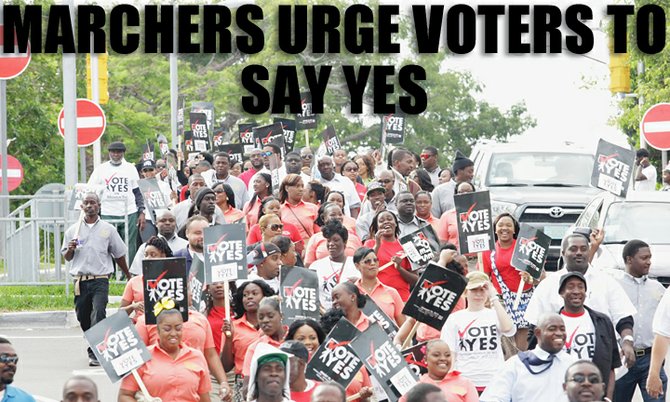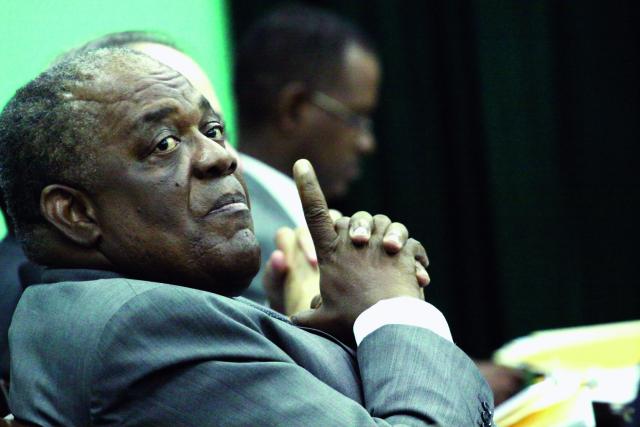THE RIGHT NOT TO BE DISCRIMINATED AGAINST

By R. Rawle Maynard
Article 26 of The Constitution of The Commonwealth of The Bahamas (which is under the title PROTECTION OF FUNDAMENTAL RIGHTS AND FREEDOMS OF THE INDIVIDUAL) provides that (1) “No Law shall make any provision which is discriminatory either of itself or in its effect” and (2) “no person shall be treated in a discriminatory manner by any person acting by virtue of any written law or in the performance of the functions of any public authority.”
It has been alleged by political leaders and persons learned in the law, including women, that the Constitution of The Commonwealth of The Bahamas discriminates against women in that women are treated differently than men in the ability of their spouses and children to acquire citizenship. In response to the allegation, the Government has announced that steps are being taken with a view to the amendment of The Constitution to remedy this perceived defect.
The Constitution is a document; it provides the form in which the State is organized; a body of legal or traditional principles regulating the relation of State authorities to each other and the governed. Documents cannot discriminate, people discriminate against each other. If there is discrimination against women in the Bahamas in relation to The Constitution, it is done by those who interpret and those who enforce the Constitution.
Sometime between 1967 and 1973 the political leadership in the Bahamas set out upon a mission to achieve a sovereign democratic state; this goal was made an issue in the general election of 1972 and a majority of the electorate indicated approval. A “White Paper” and a “Green Paper” setting out a draft of the proposed constitution were circulated for discussion before a conference for its production was convened. The Conference among other considerations had to determine who would become the citizens of the New State.
Participating in The Constitutional Conference were all shades of political opinion in the colony of the Bahamas. A majority of the voters who participated in the 1972 elections were women.
In the primitive state the largest group to which humans belonged was the family which expanded to become the tribe and such a group served to include and exclude. In Greece the sense of exclusiveness was carried to its extreme. Before Alexander of Macedon conquered Asia, each Greek city gave citizenship to the sons of citizens and generally Greeks developed a sense of snobbish exclusiveness which considered all others inferior, indeed, all non-Greeks were considered barbarians and denied citizenship and so were their children.

It can be discerned from the preamble to The Constitution that the Bahamian people saw statehood as an inheritance, meanwhile government had become the overseer of a jobs program bolstered by a non-immigration policy for protection of their inheritance. In their wisdom, the conference delegation adopted a protective sense of snobbish exclusiveness and constructed the Constitution on a foundation that the Bahamian citizen shall have no other citizenship than Bahamian and dual nationality would not be tolerated. It is from this stance that the perception of discrimination became apparent.
Article 1 of The Constitution declares that The Commonwealth of The Bahamas shall be a sovereign democratic state (That means that sovereignty is in the people) and Article 2 states that the Constitution shall be Supreme Law. Chapter 2 sets out who on the 10th July 1973 would have become citizens; and who after the 10th July 1973 would be or were eligible to become citizens in accordance with legal and traditional principles. According to reports in the media, the women’s complaints relate to Articles 8, 9 and 10 of Chapter 2 of the Constitution.
However, so far as citizenship is concerned persons automatically became citizens on 10th July 1973 (1) who were on the 9th July 1973 Citizens of The United Kingdom and Colonies born in the former Colony of The Bahamas, (2) every person outside of the Bahamas who is on 9th July 1973 a citizen of The United Kingdom and Colonies if his father becomes or would but for his death have become a citizen of The Bahamas (3) every person who on 9th July 1973 is a citizen of The United Kingdom and Colonies under the British Nationality Act 1948 by virtue of his having been registered in the former Colony of the Bahamas, but it would not apply to persons who, inter alia, possessed the nationality of some other Country .
Article 5 provides that (1) any woman who on 9th July, 1973, is or has been married to a person who becomes a citizen of the Bahamas by virtue of naturalization under the British Nationality Act 1948, shall be entitled, upon making application and upon taking the oath of allegiance or such other declaration as may be prescribed, to be registered as a citizen of the Bahamas.
Article 6 provides that every person born in the Bahamas after the 9th July 1973 shall become a citizen of the Bahamas at the date of his birth if at that date either of his parents is a citizen of The Bahamas.
Article 7 a person born in the Bahamas, after 9th July 1973 neither of whose parents is a citizen of The Bahamas shall be entitled, upon making application on his attaining the age of eighteen years or within twelve months thereafter to be registered as a citizen of The Bahamas provided that if he is a citizen of some other country he has to renounce that other citizenship.
Article 8 provides that a person born outside of The Bahamas after the 9th July 1973 shall become a citizen of The Bahamas at the date of his birth if at that date his father is a citizen of The Bahamas.
Article 9 “Notwithstanding anything contained in Article 8 of this Constitution, a person born legitimately outside of the Bahamas after 9th July 1973 whose mother is a citizen of the Bahamas shall be entitled upon making application on his attaining the age of eighteen years and before he attains age of 21 years in such manner as may be prescribed, to be registered as a citizen of The Bahamas.”
“Provided that if he is a citizen of some country other than the Bahamas he shall not be entitled to be registered as a citizen of the Bahamas, unless he renounces his citizenship of that other country, takes the Oath of Allegiance and makes and registers such declaration of his intentions concerning residence as may be prescribed.”
Article 10 “Any woman who, after 9th July 1973, marries a person who is or becomes a citizen of the Bahamas shall be entitled, provided she is still so married, upon making application in such manner as may be prescribed and upon taking the Oath of Allegiance or such other declarations as may be prescribed, to be registered as a citizen of The Bahamas”
What the foregoing articles reveal is that great care is taken to ensure that anyone who becomes a citizen of The Bahamas has only citizenship of the Bahamas and of no-other country.
In the reading and interpretation of a Constitution the document must be read as a whole in the context of the subject matter, tradition and legal principles and all parts must be in harmony. In the case of HINDS v THE QUEEN [1977] A.C 195 at 211 D Lord Diplock in the judgement of The Privy Council said:-
“A written constitution, like any other written instrument affecting legal rights or obligations, falls to be construed in the light of its subject matter and of the surrounding circumstances with reference to which it was made.”
And in the case of the A.G. of THE GAMBIA V JOBE [1985] LRC (const) 556 (Privy Council) said: – “A Constitution and in particular that part of it which protects and entrenches fundamental rights and freedoms…is to be given a generous and purposive construction”
Nevertheless, the Bahamas is free to make whatever laws it pleases within the limits imposed by the Constitution but when it comes to citizenship unless such laws are consistent with International Law and are recognized by other countries they will be ineffective.
However, when the Bahamas Constitution is read taking into account International Law, the structure and importance of family, Traditional and legal principles and Christian values purposively and in harmony with the full document you find that it does not discriminate against women.
According to International Law nationality derives from three sources: (i) place of birth (ii) consanguinity (blood-line) and (iii) naturalisation
Article 8 does not treat that mother differently than it treats the father because in the interpretation of that Article reference must be made to Article 14 where it is provided that “any reference in this chapter to the father of a person, shall in relation to any person born out of wedlock other than a person legitimated before the 10th July 1973, be construed as a reference to the mother of that person.”
In Article 9 which concerns a person born legitimately outside of the Bahamas a distinction is made between the married mother and the unmarried mother but this is so because this article is intended to address the case where the father is not Bahamian and the child of the married mother is entitled to the nationality of a father who is a national of another country, whereas the child of the unmarried mother derives his nationality exclusively from his mother.
In summary anyone deriving nationality exclusively from a parent or parents whose nationality is Bahamian becomes a Bahamian at birth whether born inside or outside of The Bahamas but a person who derives nationality by place of birth (Bahamas) and is entitled to claim the nationality of some other country he must renounce that other nationality before he can be registered as a citizen.
Another misconception affecting the child of a married Bahamian woman is that registration confers citizenship. The right of citizenship derives from place of birth or parent and in every case registration of birth merely certifies such derivation and an existing right. Registration of citizenship serves the same purpose, it is a certification of an existing right.
Because a child is unable to renounce another citizenship to which he may also be entitled he has to wait to be certified by way of registration until after he is 18 years old. It is therefore absolutely incorrect to say that he is applying for citizenship when he applies for registration. He already has the right of citizenship but is disabled from using it due his minority and inability to renounce the other nationality to which he is also entitled.
Unfortunately, the government administration has treated persons whose registration is postponed for eighteen years discriminately and sometimes illegally for some of such persons have been illegally deported, the Haitian President may have been hinting at this when he said that Haiti may decide not to accept them. There is no need to consider amending the Constitution to remedy a fault that does not exists but the question whether dual nationality during minority should be allowed needs urgent attention, for it is a violation of International Law to make a person stateless.
Undoubtedly, the perception that statehood is an inheritance has led to the creation of classes of citizenship, persons born in the Bahamas of Bahamian parents are classified as heirs whilst persons who require registration are classified as paper citizens and consequently are less entitled to inheritance.
There is certainly an appearance that a certain class of women, motivated by a yearning for political power and for devious reasons, would take advantage of the complications and uncertain administration of exclusive singular nationality to mislead others.
There is a well entrenched traditional legal principal and Christian value, that when a woman marries a man she joins his family and takes his name; in so doing she subordinates herself not so much to the husband as to the principles which govern the family for the preservation of order and peace and the promotion of love in the family.
If it appears that the male spouse is subjected to greater scrutiny and a more rigid process in acquiring the nationality of the wife it is not conclusively discrimination against either one of them but may be attributed to the traditional legal principles above mentioned.
The consequences of the destruction of traditional principles and family values can be grave.
The Constitution of The Commonwealth of The Bahamas cannot contradict itself; it does not discriminate against anyone but there is a problem of misinformation among the people which can be remedied by education.
Moreover and in any event, Article 13 Chap. 2 of The Constitution empowers Parliament to make provision for the acquisition of citizenship of The Bahamas by persons who do not become citizens by of The Bahamas by virtue of the provisions of this Chapter.
Therefore, Parliament has the ability to rectify any form of discrimination relating to citizenship, perceived or real whether by The Constitution or administrative, without amendment of The Constitution.
— END–







